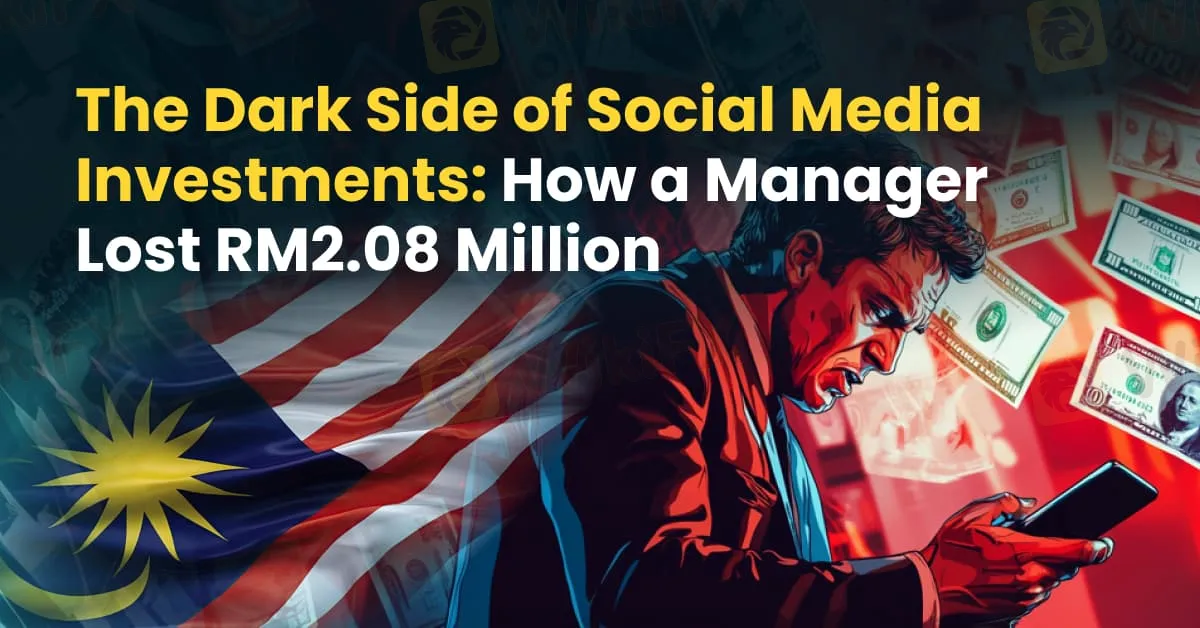简体中文
繁體中文
English
Pусский
日本語
ภาษาไทย
Tiếng Việt
Bahasa Indonesia
Español
हिन्दी
Filippiiniläinen
Français
Deutsch
Português
Türkçe
한국어
العربية
The Dark Side of Social Media Investments: How a Manager Lost RM2.08 Million
Abstract:A Malaysian company manager suffered financial losses amounting to RM2.08 million after becoming the victim of an investment scam promoted through Facebook.

A Malaysian company manager suffered financial losses amounting to RM2.08 million after becoming the victim of an investment scam promoted through Facebook. The fraudulent scheme, which promised lucrative returns, ultimately led to significant monetary losses.
According to Selangor police chief Datuk Hussein Omar Khan, the 52-year-old man became involved in the scheme in August of the previous year. After encountering the investment offer on Facebook, he was subsequently added to a WhatsApp group managed by an individual known as Charles. The group served as a platform for persuading participants to invest in what was later revealed to be a non-existent financial opportunity.

Following the guidance provided by the schemes organisers, the victim proceeded to transfer funds through nine separate transactions to different bank accounts. Initially believing he was making profitable investments, he continued to comply with instructions. However, suspicions arose when he was repeatedly asked to make additional payments to access his supposed profits. At this point, it became evident that he had been deceived.
Authorities have classified the case under Section 420 of the Penal Code, which deals with cheating offences. Law enforcement officials have reiterated the importance of public vigilance when encountering investment offers on social media, particularly those that promise unrealistic returns.
With online financial fraud becoming increasingly sophisticated, industry experts emphasise the necessity of verification tools that help individuals assess the legitimacy of brokers and investment platforms. One such tool, WikiFX, has gained prominence for its role in equipping investors with critical information. The platform provides a comprehensive database of global broker profiles, regulatory status updates, and user reviews, enabling individuals to make informed decisions before committing their funds.

WikiFX's risk assessment features are designed to identify unlicensed or suspicious entities, issuing alerts that help potential investors spot red flags early on. By leveraging such resources, individuals can conduct thorough research, verify credentials, and ultimately safeguard their financial assets from fraudulent schemes.

Disclaimer:
The views in this article only represent the author's personal views, and do not constitute investment advice on this platform. This platform does not guarantee the accuracy, completeness and timeliness of the information in the article, and will not be liable for any loss caused by the use of or reliance on the information in the article.
Read more

Common Tactics Used in Online Trading Fraud Today
Know the top online trading scams of 2025, from fake apps to pump-and-dump tricks. Simple tips to spot and avoid them, keeping your money safe in this easy guide.

U.S. March ISM Manufacturing PMI Released
The U.S. March ISM Manufacturing PMI data shows that manufacturing has contracted for the first time, and investors should pay attention to future changes and impacts on the sector.

Breaking News! Forex Inflows Surge to $17 Billion
Nigeria's foreign exchange inflows saw a significant increase in the fourth quarter of 2024, reaching $17.39 billion. This growth reflects strong foreign investments and export revenues, bringing new confidence to the market.

Should You Beware of Forex Trading Gurus?
Know the reality behind forex trading gurus, examining their deceptive tactics, inflated promises, and the risks associated with trusting them for financial advice.
WikiFX Broker
Latest News
FCA Warns Against 10 Unlicensed or Clone Firms
CySEC Warns Against 14 Unlicensed Investment Websites
Top Currency Pairs to Watch for Profit This Week - March 31, 2025
Will natural disasters have an impact on the forex market?
Philippines Deports 29 Indonesians Linked to Online Scam Syndicate in Manila
Exposing the Top 5 Scam Brokers of March 2025: A Closer Look by WikiFX
Gold Prices Climb Again – Have Investors Seized the Opportunity?
Webull Launches SMSF Investment Platform with Zero Fees
Australian Regulator Warns of Money Laundering and Fraud Risks in Crypto ATMs
The Withdrawal Trap: How Scam Brokers Lure Victims into Paying More
Currency Calculator







